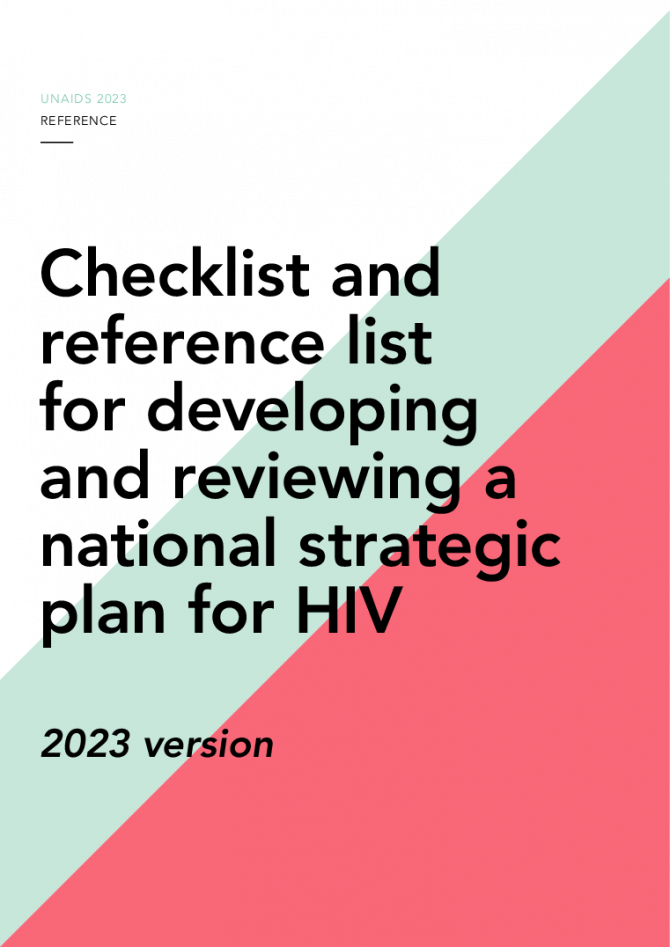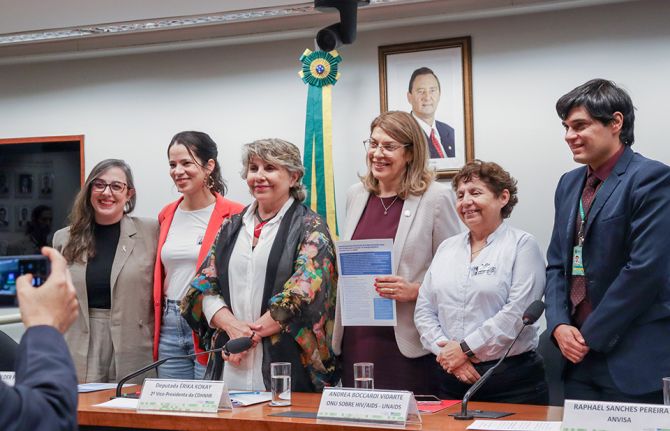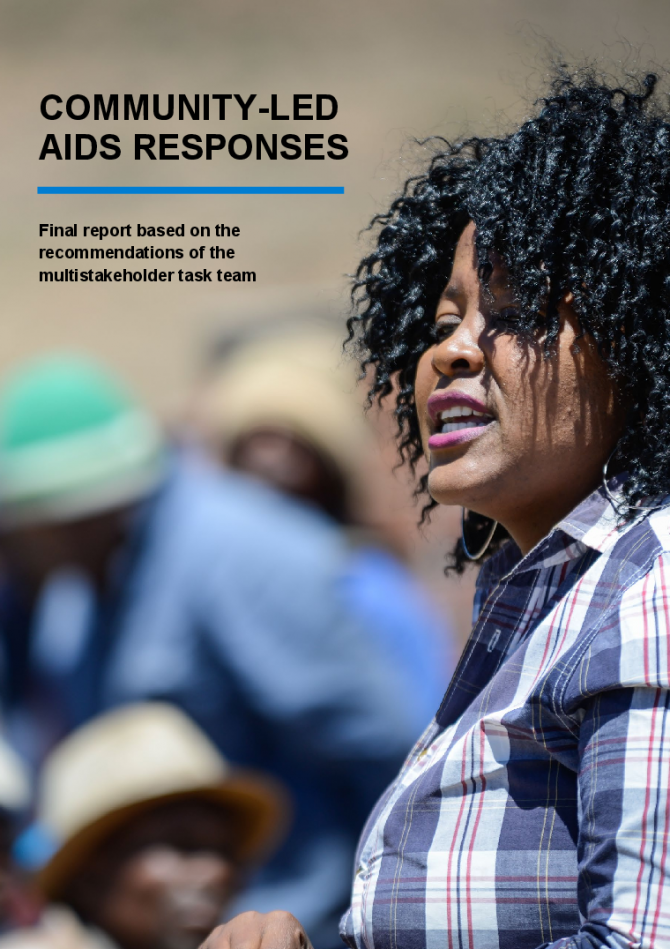
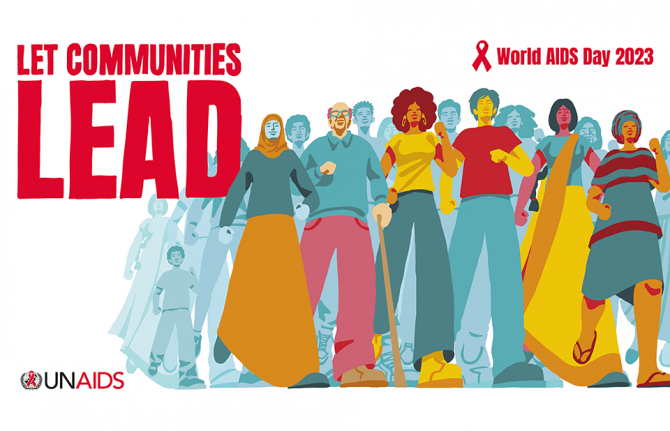
Press Release
Ahead of World AIDS Day UNAIDS is calling for urgent support to Let Communities Lead in the fight to end AIDS
30 November 2023 30 November 2023A new report by UNAIDS demonstrates the critical role communities play, and how underfunding and harmful barriers are holding back their lifesaving work and obstructing the end of AIDS.
LONDON/GENEVA, 28 November 2023—As World AIDS Day (1 December) approaches, UNAIDS is urging governments across the world to unleash the power of grassroots communities across the world to lead the fight to end AIDS. A new report launched today by UNAIDS, Let Communities Lead, shows that AIDS can be ended as a public health threat by 2030, but only if communities on the frontlines get the full support they need from governments and donors.
“Communities across the world have shown that they are ready, willing and able to lead the way. But they need the barriers obstructing their work to be pulled down, and they need to be properly resourced,” said Winnie Byanyima, Executive Director of UNAIDS. “Too often, communities are treated by decision-makers as problems to be managed, instead of being recognised and supported as leaders. Communities are not in the way, they light the way to the end of AIDS.”
The report, launched in London during a World AIDS Day event organized by the civil society organization STOPAIDS, shows how communities have been the driving force for progress.
Community advocacy from the streets to the courtrooms to parliaments has secured groundbreaking changes in policy. Communities’ campaigning helped open up access to generic HIV medicines, leading to sharp, sustained reductions in the cost of treatment from US$ 25 000 per person per year in 1995 to less than US$ 70 in many countries most affected by HIV today.
Let Communities Lead shows that investing in community-led HIV programmes delivers transformational benefits. It sets out how programmes delivered by community-based organizations in Nigeria were associated with a 64% increase in access to HIV treatment, a doubling of the likelihood of HIV prevention service utilization, and a four-fold increase in consistent condom use among people at risk of HIV. It also notes how, among sex workers reached by a package of peer-based services in the United Republic of Tanzania, the HIV incidence rate was reduced to below half (5% vs 10.4%).
“We are the vehicle for change that can end systematic injustices that continue to fuel HIV transmission. We have seen groundbreaking developments with U=U, improved access to medicines, and have made great strides in decriminalisation," said Robbie Lawlor, Co-Founder of Access to Medicines Ireland. “Yet, we are expected to move mountains without being financially supported. We are supposed to fight for a more equitable world and are tasked with dismantling stigma yet are side-lined in crucial discussions. We are at a tipping point. Communities can no longer be relegated to the periphery. The time for leadership is now.”
The report highlights how communities are at the forefront of innovation. In Windhoek, Namibia, a self-funded project by the youth Empowerment Group is using e-bikes to deliver HIV medicines, food and adherence support to young people who often cannot attend clinics due to their schooling hours. In China, community organizations developed smartphone apps that link people to self-testing which contributed to a more than four-fold increase in HIV tests across the country from 2009 to 2020.
The report reveals how communities are also holding service providers to account. In South Africa five community networks of people living with HIV inspected 400 sites across 29 districts and conducted more than 33 000 interviews with people living with HIV. In the Free State province, these findings led provincial health officials to implement new appointment protocols to reduce clinic wait times and three- and six-month dispensing of antiretroviral medicines.
“I am extremely concerned about the exclusion from health services of key populations like the LGBT+ community,” said Andrew Mitchell, Minister of State for Development and Africa. “The UK champions the rights of such communities, and we will continue to protect them, working closely with our partners in civil society. I thank UNAIDS for keeping us focused on the inequities driving the pandemic and I look forward to working with our partners to champion the voice of people living with HIV and end AIDS as a public health threat by 2030.”
Despite the clear evidence of community-led impact, community-led responses are unrecognized, under-resourced and in some places even under attack. Crackdowns on civil society and on the human rights of marginalized communities are obstructing communities from providing HIV prevention and treatment services. Underfunding of community-led initiatives is leaving them struggling to continue operating and holding them back from expansion. If these obstacles are removed, community-led organizations can add even greater impetus to end AIDS.
In the 2021 Political Declaration on ending AIDS, United Nations member states recognized the critical role communities play in HIV service delivery, particularly to people most at risk of HIV. However, whereas in 2012, when over 31% of HIV funding was channelled through civil society organizations, ten years later, in 2021, only 20% of funding for HIV was available—an unprecedented backsliding in commitments which has cost and is continuing to cost lives.
“At this time, community-led action is the most important countermeasure in the AIDS response,” said Solange Baptiste, Executive Director of the International Treatment Preparedness Coalition. “Yet, shockingly, it isn’t a cornerstone of global plans, agendas, strategies, or financing mechanisms for improving pandemic preparedness and health for all. It is time to change that.”
Every minute, a life is lost to AIDS. Every week, 4000 girls and young women become infected with HIV, and out of the 39 million people living with HIV, 9.2 million do not have access to lifesaving treatment. There is a Path that Ends AIDS and AIDS can be ended by 2030, but only if communities lead.
UNAIDS is calling for: Communities’ leadership roles to be made core in all HIV plans and programmes; Communities’ leadership roles to be fully and reliably funded; And for barriers to communities’ leadership roles to be removed.
The report features nine guest essays from community leaders, in which they share their experience on the achievements they have secured, the barriers they face, and what the world needs to end AIDS as a public health threat.
UNAIDS
The Joint United Nations Programme on HIV/AIDS (UNAIDS) leads and inspires the world to achieve its shared vision of zero new HIV infections, zero discrimination and zero AIDS-related deaths. UNAIDS unites the efforts of 11 UN organizations—UNHCR, UNICEF, WFP, UNDP, UNFPA, UNODC, UN Women, ILO, UNESCO, WHO and the World Bank—and works closely with global and national partners towards ending the AIDS epidemic by 2030 as part of the Sustainable Development Goals. Learn more at unaids.org and connect with us on Facebook, Twitter, Instagram and YouTube.
Contact
UNAIDS GenevaSophie Barton Knott
tel. +41 79 514 6896
bartonknotts@unaids.org
UNAIDS Media
communications@unaids.org
UNAIDS Geneva
Michael Hollingdale
tel. +41 79 500 2119
hollingdalem@unaids.org
World AIDS Day message
World AIDS Day 2023
Watch the launch
World AIDS Day report
World AIDS Day videos
Documents
Checklist and reference list for developing and reviewing a national strategic plan for HIV
16 May 2023
The 2023 checklist and reference list is an updated version of the UNAIDS’s 2020 version Checklist and reference list for developing and reviewing a national strategic plan for HIV and is intended to serve as a helpful tool for developing and revising countries’ national strategic plans for HIV. The checklist is in line with the Global AIDS Strategy 2021-2026 priority strategic and results areas and the 2025 global HIV targets. It complements and builds on the most recent normative and technical guidance developed by UNAIDS, the UNAIDS cosponsors and The Global Fund’s Secretariat. It includes hyperlinks for such guidance, technical recommendations and other references for easy reference.
This checklist, including the YES, PARTIAL and NO response choices and justification, is not intended to be submitted to UNAIDS but rather is a self-assessment tool to help with the NSP review or development to understand relevant options and make evidence-informed decisions for the country to produce a meaningful, useful and impact-oriented NSP. The checklist has two parts for NSP self-assessment: high-level cross-cutting content (Part A) and specific programme content (Part B).
Part A applies to all countries and contains analyses of situations and responses to inform NSP development, the key principles of NSP development process, the goal, targets and priority-setting, and the principles of human rights, equity and sustainability. Part B contains the policy and programme requirements for HIV prevention, testing and diagnosis, treatment and care, addressing comorbidities and co-infections, enabling implementation and scaling up of integrated people-centred strategies, systems and interventions, social protection, health systems, community engagement and community-led responses, human rights and gender equity, efficiency and effectiveness, governance, management and accountability, HIV in humanitarian crises, and pandemic preparedness and response. Countries need to select the relevant elements of Part B depending on context and consultations with wider groups of stakeholders.

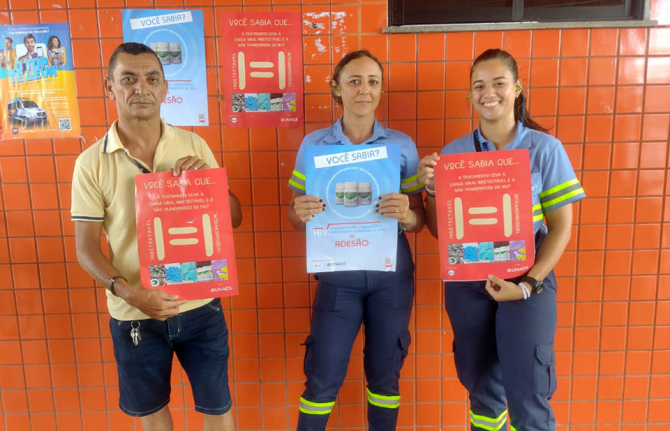
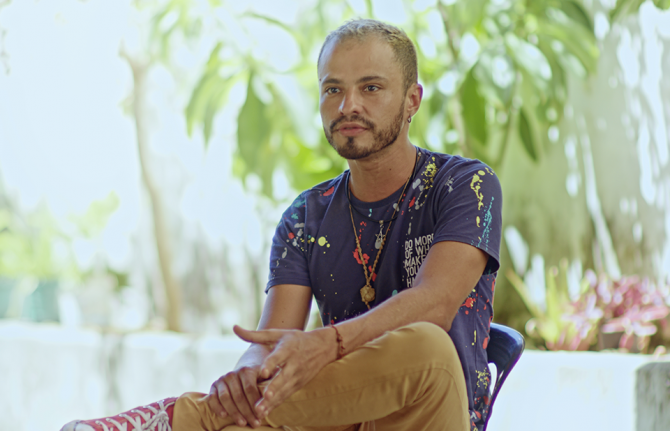
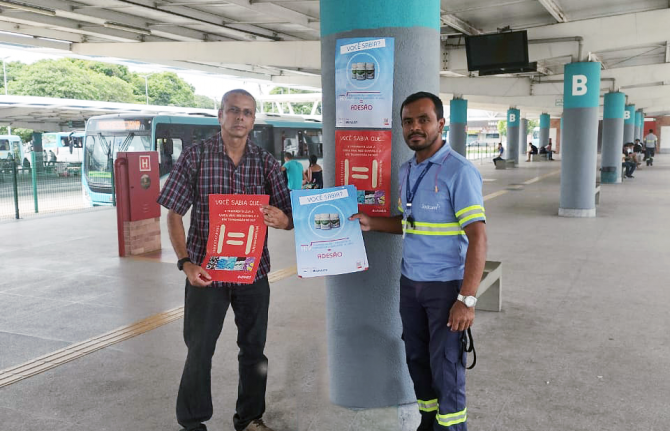
Feature Story
In Northeast Brazil, civil society and local government collaborate to increase HIV treatment adherence
03 April 2023
03 April 2023 03 April 2023In 1988, a group of activists came together in Fortaleza, the fifth largest city in Brazil and capital of Northeastern state of Ceará, to create the local chapter of the National Network of People Living with HIV and AIDS (RNP+CE). The aim was to ensure that people living with HIV could be guaranteed the right to care, treatment adherence, and legal assistance.
Currently, the NGO (Non-Government Organizations) also offers educational workshops, support for the combination prevention of sexually transmitted infections (STIs), and other activities for more than 1,000 registered people. Among them is Carlos Salmão, an HIV activist living in Fortaleza, who felt individually and collectively welcomed by the organization. "This support was very important to me and is fundamental for people living with HIV here in Ceará because it is a reference of the response to the AIDS epidemic. That is why I feel pleasure in contributing", he explains.
The RNP+CE was one of five Brazilian NGOs that received resources from the Fast-track Cities grants initiative, launched by UNAIDS in 2022. With the award, the organization developed actions around two objectives: increasing linkage and adherence of vulnerable key-populations to HIV prevention, diagnosis, and treatment by disseminating and sharing information with health professionals as well as the general public; and improving the knowledge of the Undetectable Equals Untransmittable (U = U) strategy in the city of Fortaleza by carrying out communication campaigns.
Project actions and participation of municipal government
The project involved 10 local HIV-positive activists in the development and implementation of the communication campaigns. They also were involved in preparing a seminar that brought together 120 people from civil society to dialogue about and to present to municipal government representatives proposals to improve the care for people living with HIV, based on the perspectives and actual needs of the users of public health services in Fortaleza. An additional theme of discussion was the challenges and the importance of guaranteeing a satisfactory level of adherence to HIV treatment to avoid abandonment.
Still as part of the project, a booklet on HIV, self-esteem and health was produced and distributed, providing practical information for people who receive a positive diagnosis for HIV. Additionally, in coordination with the municipal government, RNP + CE printed and distributed more than 3,000 copies of posters on HIV treatment adherence and on U = U. This material was displayed in places with high concentrations of people, such as bus terminals, reaching about 1.1 million people daily.
Participation of local government officials was a strategic element to the project’s success, as they are in direct contact with reality and the existing challenges. "We are still far from reaching an ideal level where there is less need to reinforce these [HIV] actions, but we are advancing in this direction through constant and well-structured work", says Carlos Paiva, coordinator of IST/AIDS at the Municipal Health Secretariat of Fortaleza.
Ariadne Ribeiro, UNAIDS Officer for Equality and Rights for All People, agrees and adds: "It is rewarding to see how the dialogue between communities, civil society, and the municipal government is moving towards a common goal, which is the improvement of public policies in the city of Fortaleza for people living with HIV and to end AIDS as a threat to public health."
Watch
Region/country
Related

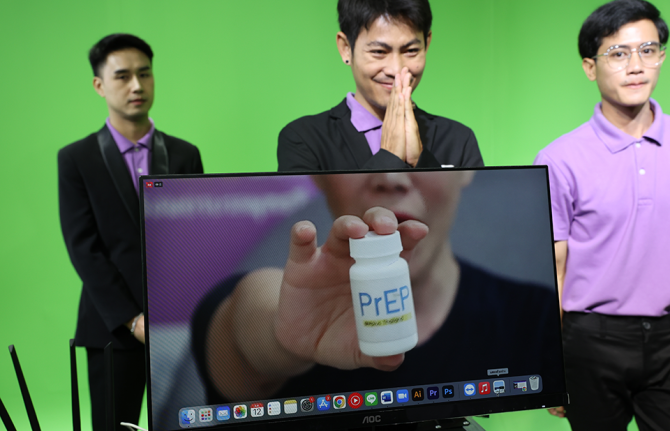
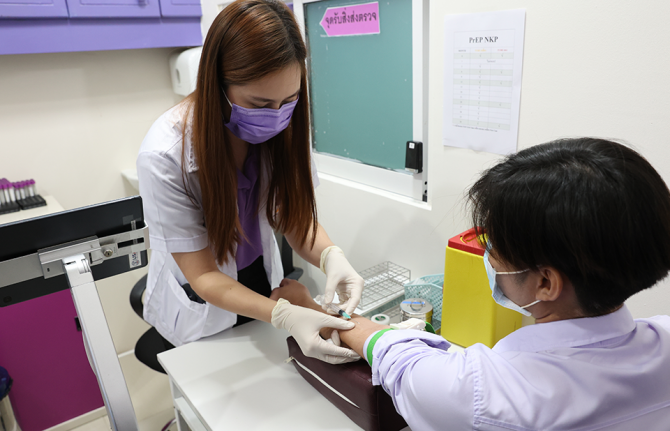
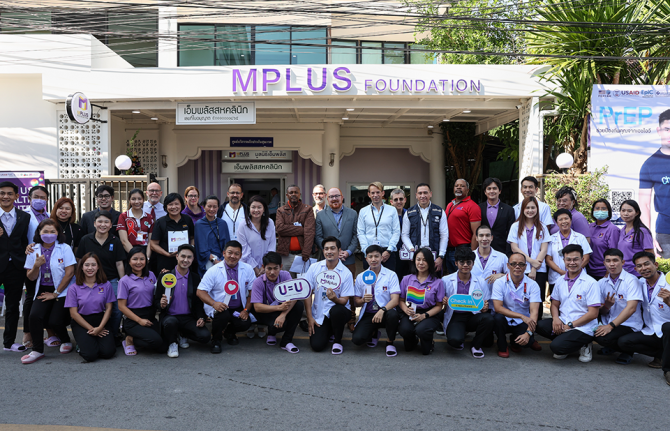
Feature Story
Thailand’s Mplus: HIV services delivered in style
13 December 2022
13 December 2022 13 December 2022“This isn’t your mother’s clinic!” said one amazed visitor.
From banners to brochures, all promotional materials are slick and cheerful. Smiling faces and toned torsos are everywhere. A purple colour scheme covers the whole building. Even files and staff face masks are colour coordinated. A pair of Facebook Live hosts have the good looks and energy of K-pop stars. And the organization’s slogan is decidedly upbeat: “where community fulfills your happiness”.
Over almost two decades, Thailand’s Mplus Foundation has refined a unique approach to providing comprehensive HV services to key population clients including men who have sex with men and transgender women.
Their method goes far beyond a cool brand identity. Mplus has leveraged domestic and international partnerships to create a key population-led health service with impressive results. They dispense more than half of the PrEP in Thailand’s Chiang Mai province.
This year they tested 95% of the almost 8000 people they reached with face-to-face services. Of those who tested positive, 91% were placed on treatment while the other 9% are in follow-up case management. And 100% of their clients who received viral load testing were found to be virally suppressed.
“Community organizations can best reach key populations to receive services. We find that people who do not want to get tested at the hospital are comfortable with peers who they know understand their life,” explained Pongpeera Patpeerapong, Director of the Mplus Foundation.
Since its formation in 2003 Mplus has evolved to deliver a full range of services. They now have health centres in four provinces, while their mobile testing units serve clients in another five districts. They support a local hospital in each province, linking people to care and helping them with adherence. Mplus provides rapid testing, CD4 and viral load monitoring, and is also authorized to dispense medication. A small fleet of motorcycles even makes PrEP deliveries to clients in remote areas.
Both their online and offline engagements are anchored by a peer-led strategy. Their social media presence is commanding—everything from Twitter to Tik Tok. There are closed Facebook groups and special applications for clients to connect with community. Offline, they go beyond information booths to host parties and sport meet-ups. These aren’t just bonding exercises. Clients book appointments online and face-to-face interactions usually result in receiving an HIV test.
Mplus also provides technical assistance to other countries. It has supported an organization in Laos with online interventions and helped community groups in Cambodia develop campaigns to promote PrEP.
They played a key role in advocating nationally for the accreditation of community health workers. All Mplus staff are certified by the Department of Disease Control following a rigorous programme of study, evaluation and practice.
The programme continues to progress. Mplus is strengthening their mental and emotional health support offering, and is working towards becoming certified to provide HIV and sexually transmitted infection (STI) treatment.
While in the past the programme was more heavily funded by the U.S. President's Emergency Plan for AIDS Relief through the United States Agency for International Development, today half of their investments come from branches of the National Health Security Office.
“Domestic funding is very important to develop our systems,” Mr. Patpeerapong said. “Community-based organizations have to be able to access domestic funding to cover more issues, including stigma and discrimination.”
Empowering key population-led health services has been crucial in improving Thailand’s HIV programme results. One of five people living with HIV in Thailand were identified and referred by a key population-led health service under the domestic health financing scheme. Four out of five people on PrEP in the country are served by community-led organizations. These services play a critical role in Thailand’s strategy of Reach, Recruit, Test, Treat, Prevent, Retain.
“Thailand is well-positioned to be a leader in addressing the need for a sustainable community-led response as a critical part of the health infrastructure,” said UNAIDS Country Director for Thailand, Patchara Benjarattanaporn. “By creating an enabling system for health outreach we can address the challenge of late diagnosis and better reach key population communities with services.”
Thailand has integrated HIV services into its Universal Health Coverage scheme and increased investments in key population- and community-led health services. UNAIDS Programme Coordinating Board (PCB) members visited Mplus and other community-led health services ahead of the 51st PCB meeting in Chiang Mai, Thailand.
Region/country

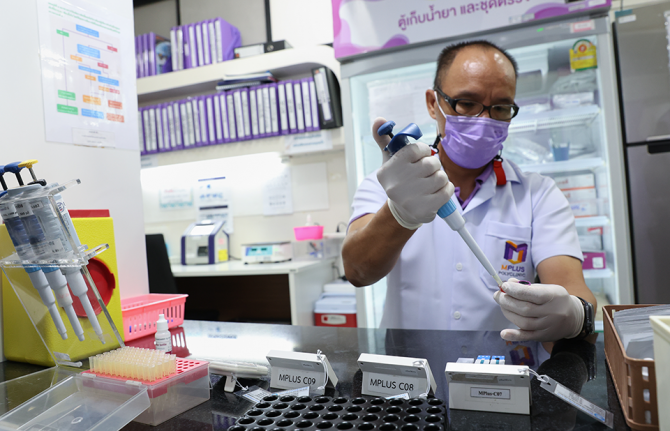
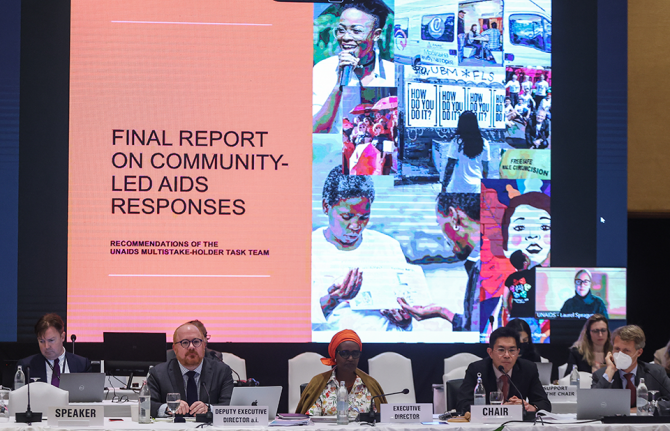

Press Release
Pandemics can only be defeated if communities are supported to lead, say governments, NGOs and UN
15 December 2022 15 December 2022CHIANG MAI, THAILAND, 15 December 2022—Community-led responses are a critical part of the AIDS pandemic response, and must be prioritised in resourcing. The approach, set out by governments, civil society organisations and United Nations agencies at an international meeting on AIDS in Chiang Mai, Thailand, will also be key for tackling other pandemics and for preparing for the pandemics to come, delegates said. The meeting saw the first international definition of a community-led response to a pandemic, published after a two-year consultative process that brought together 11 governments, representing each region of the world, and 11 civil society representatives. This UNAIDS multi-stakeholder task team on community-led responses was co-convened by the World Health Organization and United Nations Development Programme, and presented outcomes to the 51st Programme Coordinating Board meeting of the UN Joint Programme on HIV and AIDS.
Using the new definitions and recommendations, German Federal Health Minister Prof. Karl Lauterbach and the UNAIDS Executive Director Winnie Byanyima published an article in The Lancet today calling for inclusion of comprehensive “community pandemic infrastructure” in pandemic prevention, preparedness and response in new planning, international agreements, and financing. In it, the leaders show that strong community infrastructure, working synergistically with government, is a necessary but neglected element of effective pandemic prevention, preparedness, and response. Using evidence from AIDS, mpox, COVID-19, and Ebola, the authors describe how community-led organisations bring trust, communications channels, and reach to marginalised groups that complement government roles and improve equity.
The new international definitions and recommendations can help planners and funders for AIDS and other pandemics identify the elements of an effective community response. Community-led organizations, defined as "groups and networks, whether formally or informally organized ... for which the majority of governance, leadership, staff, spokespeople, membership and volunteers, reflect and represent the experiences, perspectives, and voices of their constituencies and who have transparent mechanisms of accountability to their constituencies,” form a backbone of that response. Crucially, it is noted that "not all community-based organizations are community-led.”
"While what is most often understood as infrastructure – like labs and hospitals – are important, also essential to effective pandemic response is the community infrastructure which includes people to do outreach, trusted voices who can speak to excluded communities, independent accountability mechanisms, and participation in decision-making,” explained Dr Matthew Kavanagh, UNAIDS Deputy Executive a.i for Policy, Advocacy and Knowledge. “This task team of governments, civil society, and international organizations has given important new tools to support the building and monitoring of community-led capacity. We will only be able to end AIDS and stop other pandemics by ensuring that this community infrastructure is intentionally enabled, strengthened, monitored, and resourced.”
The United Nations Joint Programme on HIV/ AIDS (UNAIDS) Board meeting in Chiang Mai included dialogue between member states and non-state participants on how to develop laws and policies to facilitate community-led response. The recommendations of the multistakeholder task team include developing better systems for financing community-led organisations, which often face legal, capacity, and eligibility barriers to national and international financing mechanisms; monitoring community-led capacity; and integrating data generated by community groups into response management.
To end the AIDS pandemic, board members pointed out, community responses to HIV must be integrated into all levels of countries’ AIDS strategies including planning, budgeting, implementation, monitoring and evaluation.
The principles developed apply not only to AIDS. "Stopping COVID-19, mpox, and Ebola, and preparing for the next pandemic, all require that partnership of government and community together. The newly agreed framework for defining and measuring community-led responses make us better equipped to address the inequalities that are holding back progress in ending AIDS,” said Dr Kavanagh.
In Thailand, as delegates saw for themselves first hand, key-population-led health services have reached people at increased risk of HIV, achieving among the most equitable HIV responses in the region. In South Africa, community leaders with Ritshidze, which represents people living with HIV, visit clinics and communities to assess COVID-19, HIV, and tuberculosis services and hold administrators accountable for addressing issues such as long waiting times or confidentiality gaps that keep some people away from health services. Amid war, Ukraine’s 100% Life, a network of people living with HIV, has used peer networks to communicate with displaced people, delivering medicines, food, and emergency assistance.
"International pandemic agreements and funding should include specific goals for community-led capacity," said Dr Kavanagh. "To be effective, pandemic responses need to move beyond one-way communications to bring communities into decision making at all levels. Community leadership is not mere nice-to-have. It is essential for ending pandemics."
The Lancet article marking the occasion by the German Health Minister and the UNAIDS Executive Director is here.
The report presented at the UNAIDS Programme Coordinating Board meeting is here.
Resources on Community Led Pandemic Response are here.
UNAIDS
The Joint United Nations Programme on HIV/AIDS (UNAIDS) leads and inspires the world to achieve its shared vision of zero new HIV infections, zero discrimination and zero AIDS-related deaths. UNAIDS unites the efforts of 11 UN organizations—UNHCR, UNICEF, WFP, UNDP, UNFPA, UNODC, UN Women, ILO, UNESCO, WHO and the World Bank—and works closely with global and national partners towards ending the AIDS epidemic by 2030 as part of the Sustainable Development Goals. Learn more at unaids.org and connect with us on Facebook, Twitter, Instagram and YouTube.

